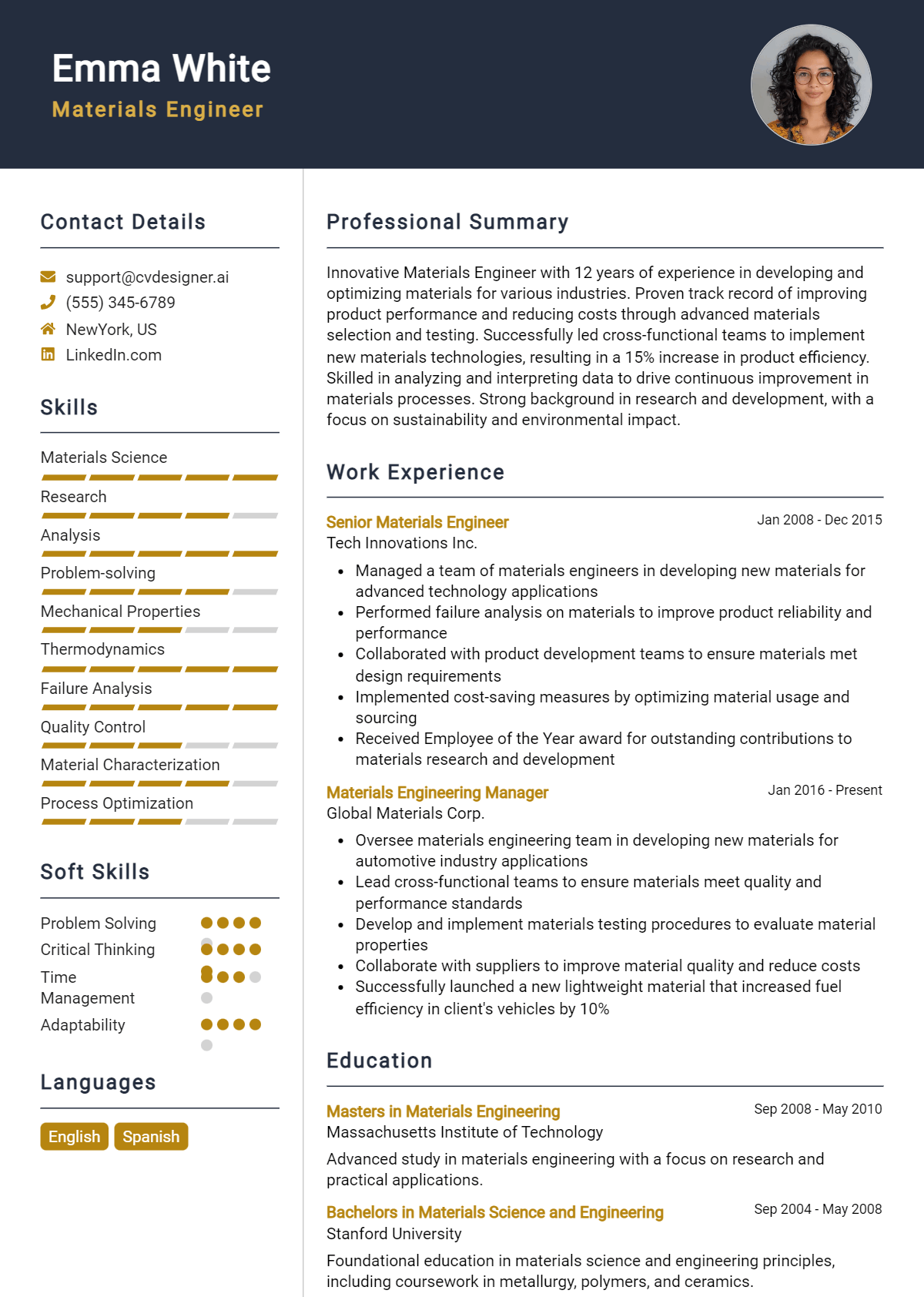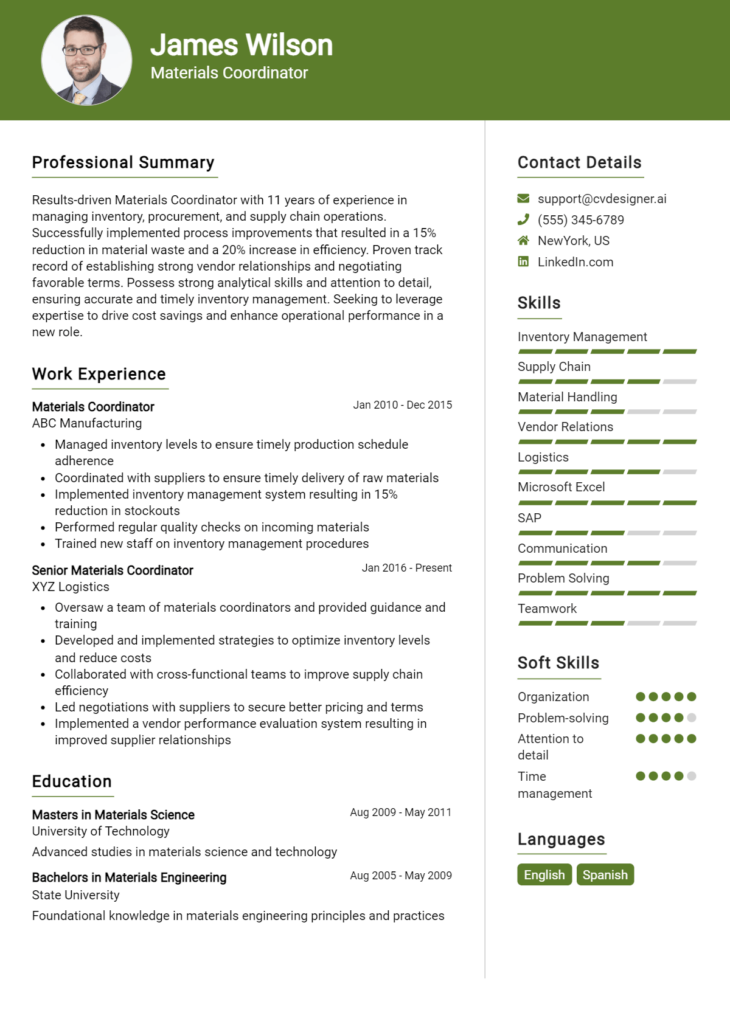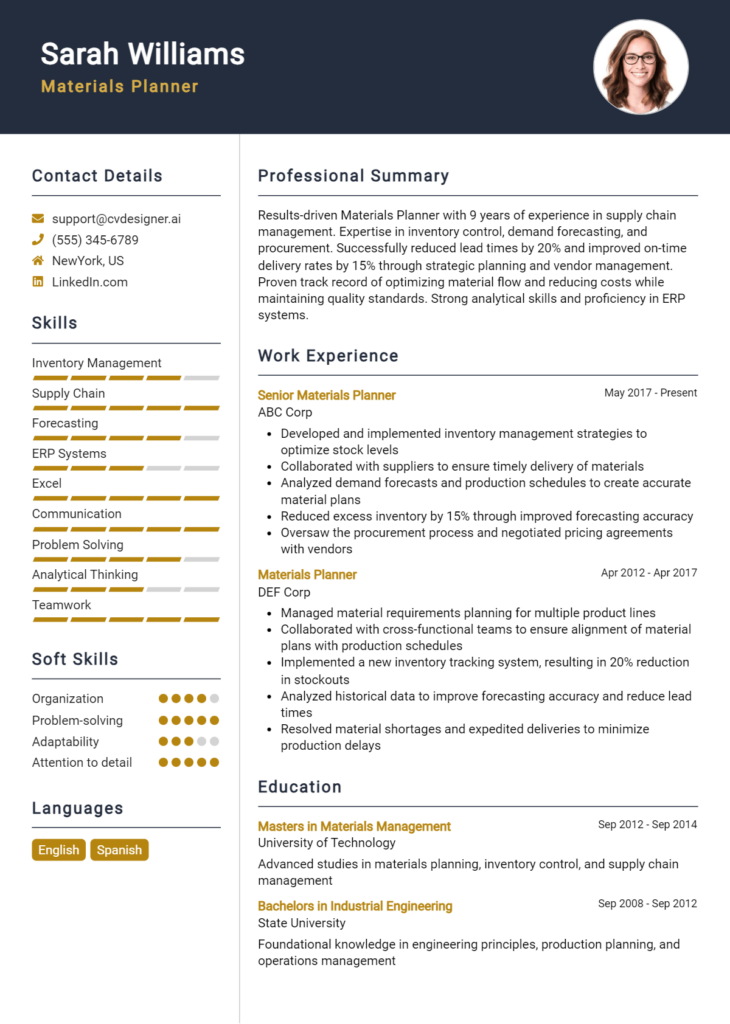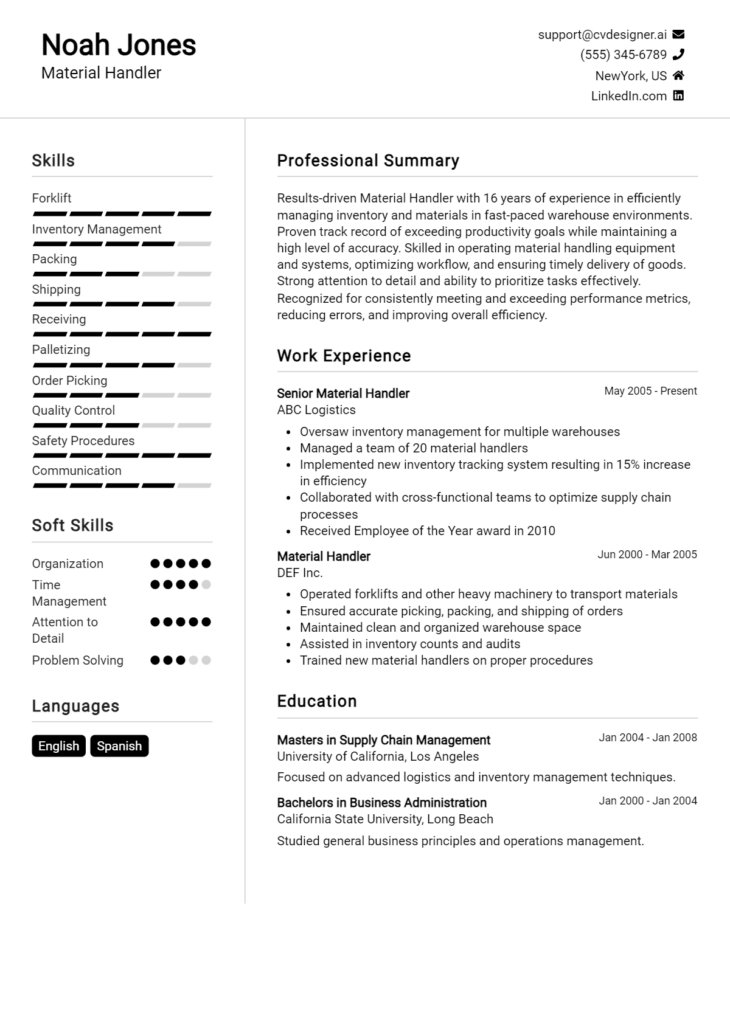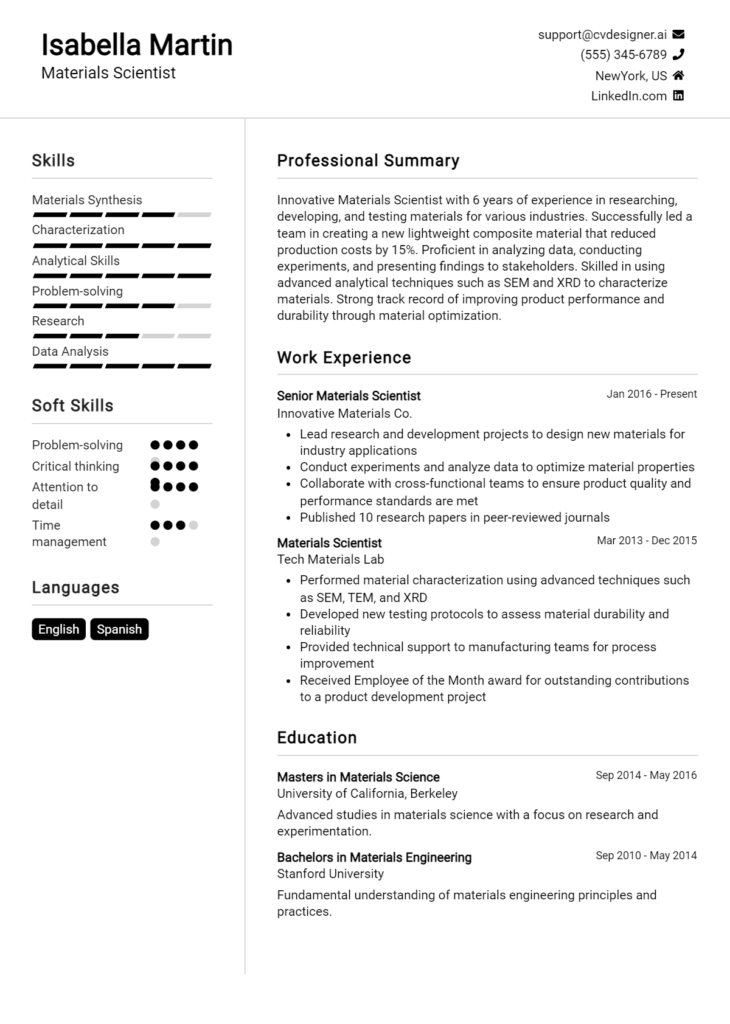Most Popular Materials Engineer Resume Examples
Explore additional Materials Engineer resume samples and guides and see what works for your level of experience or role.
As a Materials Engineer, you play a pivotal role in the development and application of materials that are essential for innovation across various industries, from aerospace to biomedical engineering. Your expertise not only contributes to the creation of advanced materials but also ensures their performance, safety, and sustainability. Given the competitive landscape of engineering positions, having a well-crafted resume is crucial—it serves as your first impression and can significantly influence hiring decisions. This guide will walk you through the essentials of crafting a standout resume tailored to the unique demands of a Materials Engineer, showcasing your skills and experience effectively.
In this comprehensive resume writing guide, we will cover key responsibilities and skills relevant to the Materials Engineer role, ensuring you highlight what employers are looking for. You’ll learn about the best formats to use for your resume and the common mistakes that could hinder your chances of landing an interview. Additionally, we will provide resume examples suitable for all experience levels, from entry-level to seasoned professionals. You will also find valuable tips on resume writing and guidance on selecting the right resume templates to enhance the visual appeal of your application. By the end of this guide, you'll be equipped with the knowledge and tools necessary to create a compelling resume that opens doors to exciting career opportunities in materials engineering.
Key Responsibilities and Skills for a Materials Engineer
Materials Engineers play a crucial role in the development, processing, and testing of materials used to create a range of products. Their key responsibilities include:
- Designing and testing materials to be used in various applications, ensuring they meet required specifications and performance standards.
- Analyzing the properties and structures of materials to understand their behavior under different conditions.
- Collaborating with other engineers and scientists to create innovative materials and improve existing ones.
- Conducting research to develop new materials that can enhance product functionality and durability.
- Overseeing manufacturing processes to ensure materials are produced efficiently and safely.
- Evaluating material failures and implementing solutions to prevent future issues.
To excel as a Materials Engineer, the following essential skills should be highlighted:
- Strong analytical and problem-solving abilities
- Proficiency in materials characterization techniques
- Knowledge of material properties and behavior
- Familiarity with computer-aided design (CAD) software
- Excellent communication and teamwork skills
- Attention to detail and project management capabilities
- Understanding of manufacturing processes and quality control
Effectively showcasing these skills in your resume skills section is vital, as it demonstrates your qualifications and suitability for the role. Tailoring your skills and responsibilities to align with the specific job description will make your application stand out. Additionally, considering how these skills can be presented in a strong CV will further enhance your chances of securing an interview. A well-crafted CV that emphasizes relevant skills and experiences can greatly influence hiring decisions.
Best Resume Format and Structure for a Materials Engineer
When crafting a resume for a Materials Engineer position, it's essential to choose a format that highlights your relevant experience, skills, and education while also being easy to read. Below is a detailed guide on structuring your resume effectively.
Contact Information
- Full Name
- Phone Number
- Email Address
- LinkedIn Profile (optional but recommended)
- Location (City, State)
Professional Summary This section serves as a brief introduction to your qualifications and career goals. Aim for 2-4 sentences that summarize your expertise in materials engineering, highlighting any specific areas of focus such as materials testing, development, or research. Use strong action verbs and quantify your achievements where possible.
Example: "Results-driven Materials Engineer with over 5 years of experience in developing innovative materials for the aerospace industry. Proven track record in leading successful projects that improved material performance by 30%. Adept at utilizing advanced software for material analysis and testing."
Work Experience List your work history in reverse chronological order, starting with your most recent position. For each role, include:
- Job Title
- Company Name
- Location (City, State)
- Dates of Employment (Month/Year - Month/Year)
- Bullet points detailing your responsibilities and achievements. Use action verbs and quantify your accomplishments to give context to your contributions.
Example:
- Materials Engineer
XYZ Aerospace, City, State
June 2019 - Present - Developed and tested new composite materials, resulting in a 25% reduction in weight without compromising strength.
- Led a cross-functional team in a project that reduced production costs by 15% through material optimization.
Education Include your highest degree first, followed by additional relevant degrees. For each entry, include:
- Degree (e.g., Bachelor of Science in Materials Engineering)
- Institution Name
- Location (City, State)
- Graduation Date (Month/Year)
- Relevant coursework or honors (if applicable)
Example:
- Bachelor of Science in Materials Engineering
University of Engineering, City, State
Graduated May 2018 - Relevant Coursework: Materials Selection, Advanced Characterization Techniques
Skills List technical and soft skills relevant to the role of a Materials Engineer. Organize them into categories if possible (e.g., Technical Skills, Software Proficiency, Soft Skills). Focus on skills that align with the job description.
Example:
- Technical Skills: Material characterization, Failure analysis, Composite materials
- Software Proficiency: ANSYS, SolidWorks, MATLAB
- Soft Skills: Problem-solving, Team collaboration, Project management
Certifications Include any relevant certifications that enhance your qualifications. This could include professional engineering licenses, safety certifications, or specialized training.
Example:
- Certified Materials Engineer (CME)
- Six Sigma Green Belt
Additional Tips
- Formatting: Use a clean, professional layout. Opt for a reverse chronological format, which is widely accepted in engineering fields. Ensure consistent font usage, spacing, and bullet point styles.
- Length: Keep your resume to one page if you have less than ten years of experience; two pages are acceptable for more extensive experience.
- Keywords: Tailor your resume for each application by incorporating keywords from the job description to pass applicant tracking systems.
When pairing your resume with a cover letter, ensure the cover letter format complements the resume's structure. Use the same font and formatting style to create a cohesive look. Your cover letter should expand on the resume, providing context to your experiences and explaining why you are a perfect fit for the specific role.
By following this guide, you can create a compelling resume that effectively showcases your qualifications as a Materials Engineer, making it easier for hiring managers to see your potential contributions to their organization.
Writing Tips and Best Practices for a Materials Engineer Resume
When crafting a resume as a Materials Engineer, it's essential to showcase your technical expertise, problem-solving abilities, and project accomplishments in a clear and compelling manner. Tailor your resume to highlight relevant skills and experiences that align with the job description, ensuring it reflects your unique qualifications. Utilizing resume writing tips can help present your information in a professional format, making it easy for hiring managers to identify your strengths. Additionally, consider how these strategies can enhance your cover letter by emphasizing your passion for materials science and engineering.
- Use strong action verbs such as "developed," "analyzed," "designed," and "optimized" to convey your contributions effectively.
- Quantify your achievements wherever possible, such as "improved material efficiency by 20%" or "led a team of 5 engineers on a project with a $1M budget."
- Incorporate industry-specific keywords that reflect your expertise and align with the job posting, such as "composite materials," "metallurgy," and "failure analysis."
- Organize your resume with clear headings and bullet points, making it easy to skim and ensuring that important information stands out.
- Highlight relevant certifications, such as Professional Engineer (PE) or certifications in specific materials testing methodologies.
- Tailor your resume for each application by adjusting the content to match the specific requirements and responsibilities outlined in the job description.
- Include technical skills and software proficiency, such as CAD software, materials testing equipment, or simulation tools, to demonstrate your hands-on capabilities.
- Keep your resume concise, ideally one page, unless you have extensive experience that warrants a two-page format, ensuring every detail adds value to your application.
Common Mistakes to Avoid in a Materials Engineer Resume
Crafting a compelling resume is crucial for a Materials Engineer, as it serves as the first impression to potential employers. However, many candidates fall into common pitfalls that can diminish the impact of their resumes. Avoiding these mistakes can significantly improve your chances of landing an interview. Here are some common errors to steer clear of when writing your Materials Engineer resume:
- Overloading with information: Including every detail can make your resume overwhelming and difficult to read.
- Using generic descriptions: Tailoring your skills and experiences to the specific job can make a stronger impression.
- Neglecting quantifiable achievements: Highlighting measurable results helps demonstrate your impact and contributions.
- Failing to use appropriate technical terminology: Using industry-specific language shows your familiarity with the field.
- Ignoring formatting consistency: A well-organized and uniformly formatted resume enhances readability.
- Omitting relevant certifications and licenses: These credentials can set you apart from other candidates.
- Not customizing for each application: A one-size-fits-all approach can lead to missed opportunities.
- Making spelling and grammatical errors: Attention to detail is critical in engineering roles, so errors can reflect poorly on your professionalism.
- Using an unprofessional email address: Ensure your contact information maintains a professional tone.
To avoid these and other errors, consider reviewing the common mistakes to avoid in a resume. Additionally, don't forget to check out the common cover letter mistakes that should also be avoided, as a strong cover letter complements your resume effectively.
Sample Materials Engineer Resumes
As a Materials Engineer, you play a crucial role in the development and application of materials in various industries, including aerospace, automotive, and electronics. Crafting a compelling resume is essential to showcase your technical expertise, problem-solving abilities, and project management skills. Below are three sample resumes tailored to different experience levels: an experienced professional, an entry-level candidate, and a career changer. Each example highlights relevant skills and achievements to help you stand out in a competitive job market.
Experienced Professional Resume
John Doe
123 Engineering Lane
City, State, ZIP
(123) 456-7890
johndoe@email.com
Professional Summary
Results-driven Materials Engineer with over 10 years of experience in developing innovative material solutions for aerospace and automotive applications. Proven track record in leading cross-functional teams, managing projects from conception to implementation, and optimizing material performance to exceed industry standards.
Professional Experience
Senior Materials Engineer
ABC Aerospace, City, State
March 2015 – Present
- Led a team of engineers in the development and testing of lightweight composite materials, resulting in a 15% reduction in aircraft weight.
- Spearheaded a project to improve the durability of existing materials, enhancing product lifespan by 20%.
- Collaborated with production teams to implement quality control processes that decreased material waste by 30%.
Materials Engineer
XYZ Automotive, City, State
June 2010 – February 2015
- Developed and tested new metallurgical processes that improved the performance of automotive components, contributing to a 25% increase in fuel efficiency.
- Conducted failure analysis on materials to identify root causes, leading to improved manufacturing practices and reduced defects by 40%.
- Presented findings at industry conferences, enhancing company visibility and credibility.
Education
Master of Science in Materials Engineering
University of State, City, State
Graduated: May 2010
Bachelor of Science in Materials Science
University of State, City, State
Graduated: May 2008
Skills
- Materials Selection and Testing
- Project Management
- Quality Assurance
- Data Analysis
- Technical Documentation
Entry-Level Candidate Resume
Jane Smith
456 Innovation Road
City, State, ZIP
(987) 654-3210
janesmith@email.com
Professional Summary
Recent graduate with a Bachelor’s degree in Materials Science and Engineering, eager to apply academic knowledge in a practical setting. Strong foundation in materials characterization and analysis, with experience in laboratory environments and team collaboration.
Education
Bachelor of Science in Materials Science and Engineering
University of State, City, State
Graduated: May 2023
Internship Experience
Materials Engineering Intern
DEF Manufacturing, City, State
June 2022 – August 2022
- Assisted in research and development of new polymer materials for packaging applications.
- Conducted tensile strength tests and analyzed data to present findings to senior engineers.
- Collaborated with a team to streamline the testing process, reducing turnaround time by 15%.
Academic Projects
- Developed a project on the sustainable use of recycled materials, presenting findings at the annual university engineering expo.
- Participated in a capstone project focused on the properties of nanomaterials, resulting in a published paper in a peer-reviewed journal.
Skills
- Laboratory Techniques
- Data Analysis Software (MATLAB, LabVIEW)
- Team Collaboration
- Strong Communication Skills
- Problem Solving
Career Changer Resume
Michael Johnson
789 Career Path Way
City, State, ZIP
(555) 123-4567
michaeljohnson@email.com
Professional Summary
Dedicated professional transitioning to a career in Materials Engineering with a strong background in mechanical engineering and project management. Skilled in analyzing material properties and implementing engineering solutions to meet performance goals.
Professional Experience
Mechanical Engineer
GHI Technologies, City, State
January 2018 – Present
- Designed and tested mechanical components and systems, ensuring compliance with material specifications and quality standards.
- Collaborated with cross-functional teams to optimize product performance, achieving a 10% increase in efficiency.
- Managed multiple projects simultaneously, adhering to strict timelines and budgets.
Project Coordinator
JKL Construction, City, State
June 2015 – December 2017
- Oversaw project timelines and resource allocation for construction projects, ensuring optimal use of materials and labor.
- Conducted site inspections and quality control assessments to ensure compliance with safety regulations and project specifications.
Education
Bachelor of Science in Mechanical Engineering
University of State, City, State
Graduated: May 2015
Certifications
- Certified Project Management Professional (PMP)
- Lean Six Sigma Green Belt
Skills
- Material Properties Analysis
- Project Management
- CAD Software (AutoCAD, SolidWorks)
- Strong Analytical Skills
- Effective Communication
Explore more resume templates for additional inspiration tailored to your unique career path. Additionally, don't forget to check out corresponding cover letter examples to create a complete job application package that captures your qualifications and enthusiasm effectively.
Checklist for a Materials Engineer Resume
- Proofread for Errors: Carefully read through your resume to catch any spelling, grammar, or punctuation mistakes. Consider using tools like Grammarly for an extra layer of proofreading.
- Consistency in Formatting: Ensure uniformity in font styles, sizes, and bullet points throughout the document. Consistent formatting enhances readability and professionalism.
- Tailor for Specific Job Applications: Customize your resume for each position by including relevant keywords from the job description. Highlight skills and experiences that are most aligned with the role.
- Quantify Achievements: Use numbers and specific examples to showcase your accomplishments (e.g., "Reduced material costs by 15% through process optimization").
- Highlight Relevant Skills: Emphasize both technical and soft skills pertinent to materials engineering, such as materials selection, failure analysis, and teamwork.
- Use Action Verbs: Start bullet points with strong action verbs (e.g., "Developed," "Analyzed," "Conducted") to convey your contributions effectively.
- Include Relevant Certifications: List any certifications or licenses that enhance your qualifications, such as Six Sigma or project management certifications.
- Limit Length: Keep your resume concise, ideally one page for early career professionals and no more than two pages for those with extensive experience.
- Seek Feedback: Share your resume with peers or mentors in the field to get constructive feedback and additional insights.
- Utilize AI Resume Builder: Consider using an AI resume builder to ensure all elements of your resume are well-organized and visually appealing.
- Extend the Checklist: Remember, a similar checklist can be followed for creating a CV or cover letter to ensure consistency across all your job application materials.
Key Takeaways for a Materials Engineer Resume Guide
As you embark on crafting your Materials Engineer resume, remember that a well-structured and targeted document can significantly enhance your job prospects. Utilize the examples and tips provided to highlight your technical expertise, problem-solving abilities, and relevant experience in the materials engineering field. To further streamline your resume creation process, consider downloading a customizable template from resume templates, or explore our comprehensive cover letter templates to pair with your application. If you prefer a more guided approach, our best resume maker is at your disposal to help you create a polished and professional resume. Additionally, adhering to similar guidelines will assist you in developing a compelling CV and an engaging cover letter. Take the next step in your career journey with confidence!
